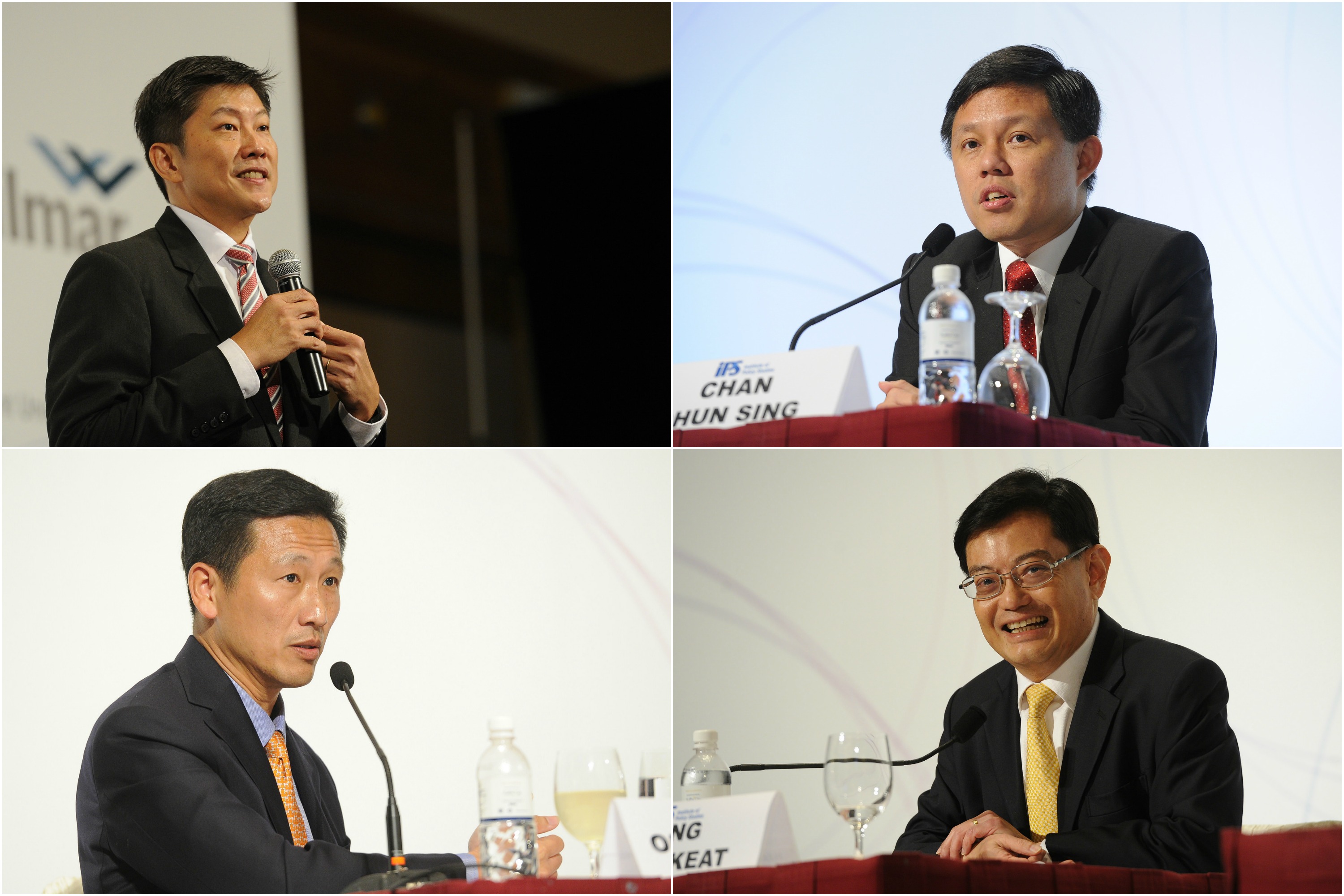Ministers Heng Swee Keat, Chan Chun Sing, Ng Chee Meng and Ong Ye Kung - these are the people one might associate as the who's who of Singapore's next generation of political leaders (i.e. potential future Prime Minister). They were also the guest-speakers at the Singapore Perspectives 2016 conference organised by the think tank Institute of Policy Studies (IPS) on Jan. 18, 2016.
It is curious then that Ministers Tan Chuan-Jin and Lawrence Wong did not join this quartet of who's who, which includes two newly minted Acting Ministers. Or perhaps Ministers Tan and Wong were just busy. Curious.
Themed “We” - after the first word in the National Pledge - IPS' flagship conference sought to reimagine what it means to be Singaporean, as Singapore strives towards SG100.
Here is how Mothership.sg reviews the four potential PMs-in-waiting:
1. Chan Chun Sing: 7.5/10
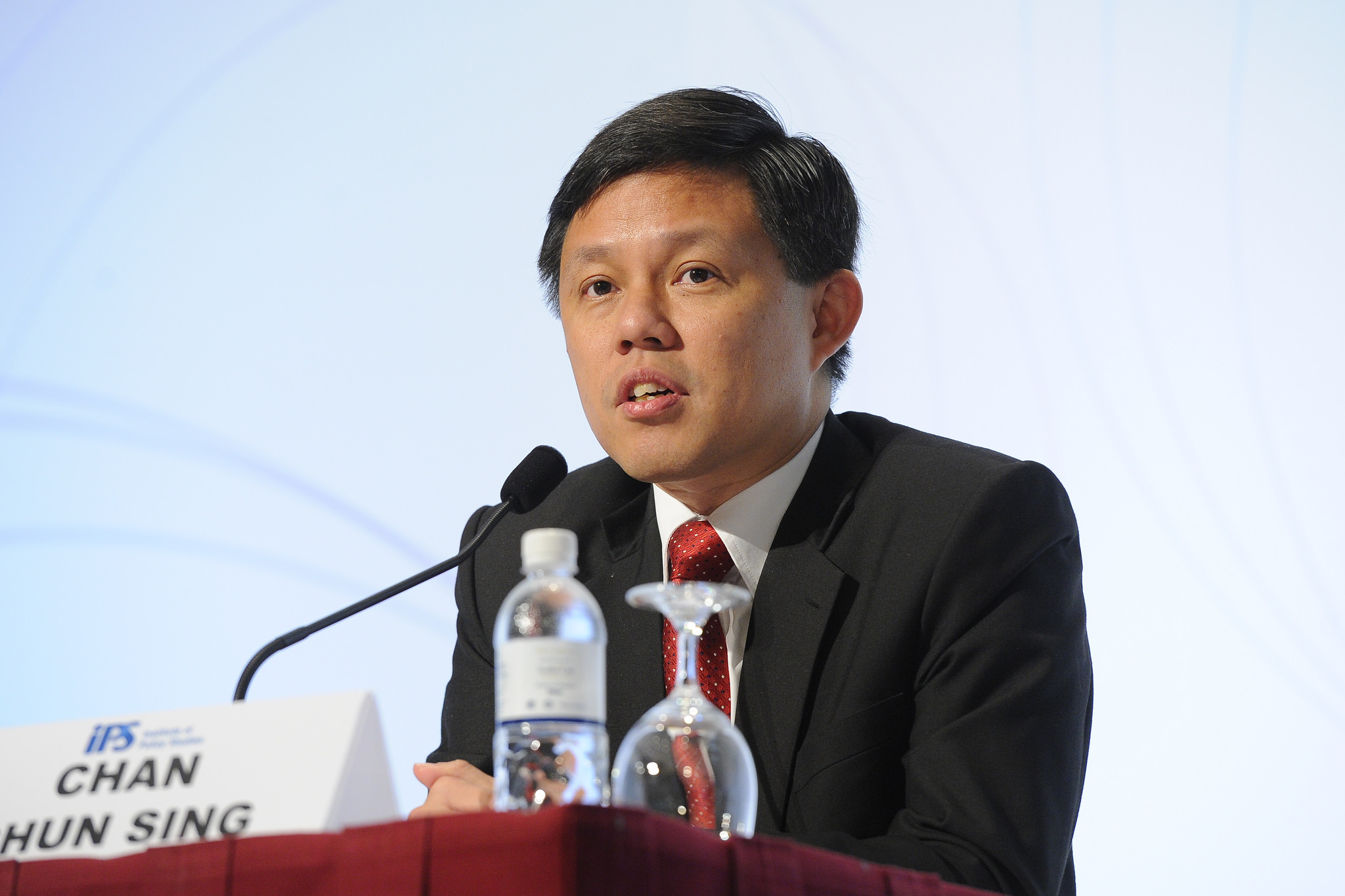 Photo courtesy of IPS
Photo courtesy of IPS
Speech-making:
Known for his off-the-cuff oratorical skills and penchant for storytelling, the labour chief as usual prefers to lace his speech and answers with real life stories based on his experience.
Dropping anecdotes like bass, he conjured up the topics of tripartism and Singapore's inter religious harmony for his topic on "Collaborative Governance", both prime examples of good collaboration.
And all the colour and anecdotes lead to one central theme of his speech: good governance, which according to Chan, must lead to better lives and livelihood for all Singaporeans and a better future for Singapore.
Perhaps understanding that his topic might be a tad too oxymoronic for most, he explained that good governance is made up of 3Ps: product/policies, people, processes and even introduced an acronym for a better model of governance (because we love acronyms): ADAM (Align goals, values and objectives of the people, Decide faster for today and tomorrow, Act collectively, decisively, Manage consequences and adjust resolutely).
The former military man spoke with quiet conviction and it certainly proved that his "kee chiu" days are officially over.
Sparring with intellectuals:
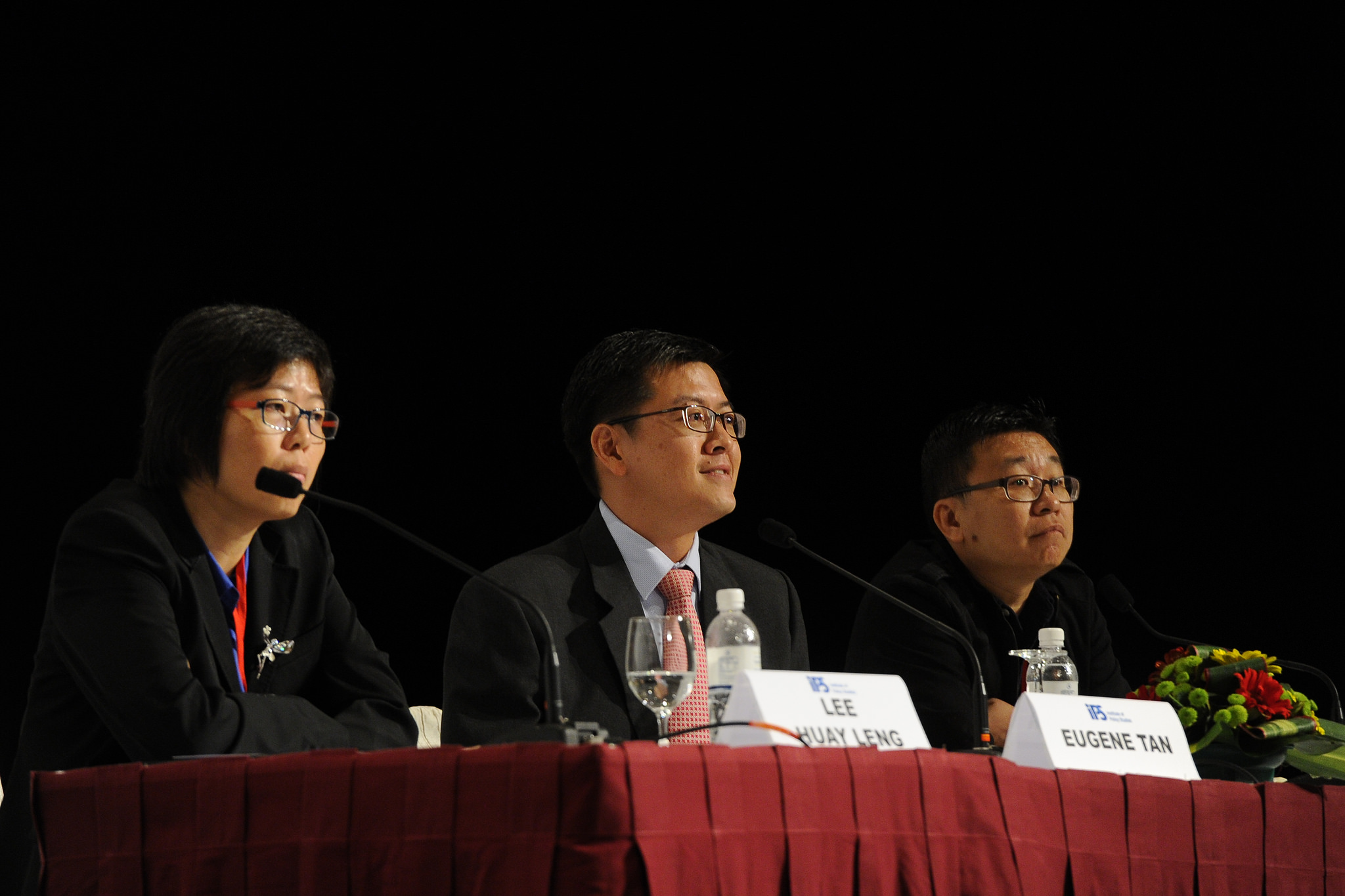 Photo courtesy of IPS
Photo courtesy of IPS
Panelist Kok Heng Leun, Artistic Director of Drama Box, posed some interesting observations for Chan to comment on. Kok said that Singaporeans have multiple identities and allegiances such as gender and social class. He mentions Chan's 3Ps of good governance and asked how the (p)rocess takes into account the multiple identities of Singaporeans and how this achieves diversity. Kok further mentioned the recent setting up of the Committee on the Future Economy (CFE) was headed by business leaders and questioned the lack of representation from other groups.
Chan said that Singaporeans with multiple identities and allegiances is not a new problem, adding that Singaporeans are not defined by a common past, language, ancestry, race, and religion. But he said that Singaporeans can always be united by a common destiny — a common future based on a set of common values. He argued that if Singapore can reach that stage where identity is based on the future, then Singapore will have something even more powerful than those nations that depend on common ancestry, race, language, and religion — the past — to define identity.
He added that people within the CFE are not only there because of their business credentials. He said for a useful dialogue to occur, the economic considerations cannot be divorced from the social and cultural ones. He said that growing the economy is not an end, but a means to provide a better livelihood for Singaporeans, and a means to grow a sense of identity for Singaporeans to be proud of.
Q&A with the public:
Chan also tackled some pointed questions from the ground, particularly from Singapore Democratic Party's Paul Tambyah, who was posing a question in his capacity as NUS professor, and, surprisingly, Ambassador-At-Large Tommy Koh.
Paul Tambyah questioned what is the purpose of governance and is it for investors or Singaporeans? To which Chan expounded on his earlier answer of better lives and better future for Singaporean. "The purpose of governance is to better the lives and livelihood of our people and to be good stewards and leave behind a better Singapore for the next generation."
Ambassador-At-Large Tommy Koh turned the screw further by invoking George Yeo's "pruning the banyan tree" speech and asking whether the People's Action Party (PAP) give more room to the civil society and reduce the role that it plays. To really drill home his point, he spoke about the example of why PAP MPs are leading sporting organisations even though some of them don't have the obvious sporting credentials (wink wink: Football Association of Singapore).
Chan replied that sometimes the MPs are charged with the responsibility because of the sport organisations' invitations and insisted that one "cannot be there as a figurehead".
He then added: "Take the football association for example. Whenever Singapore doesn't do well, which sometimes happens more often then we like (BURN), the question is what is the government going to do about this mess? So we are caught in this situation."
Quotable Quotes:
(On the government's allegedly-merciless demolishing of historical landmarks like the National Library:) "Yes, the old national library provided me with fond memories. That was the place I used to borrow my books and that was the place that inspired to want to be a librarian."
“Our concern is not whether the People's Action Party will last forever; our concern is whether Singapore will last forever."
2. Ng Chee Meng: 5.5/10
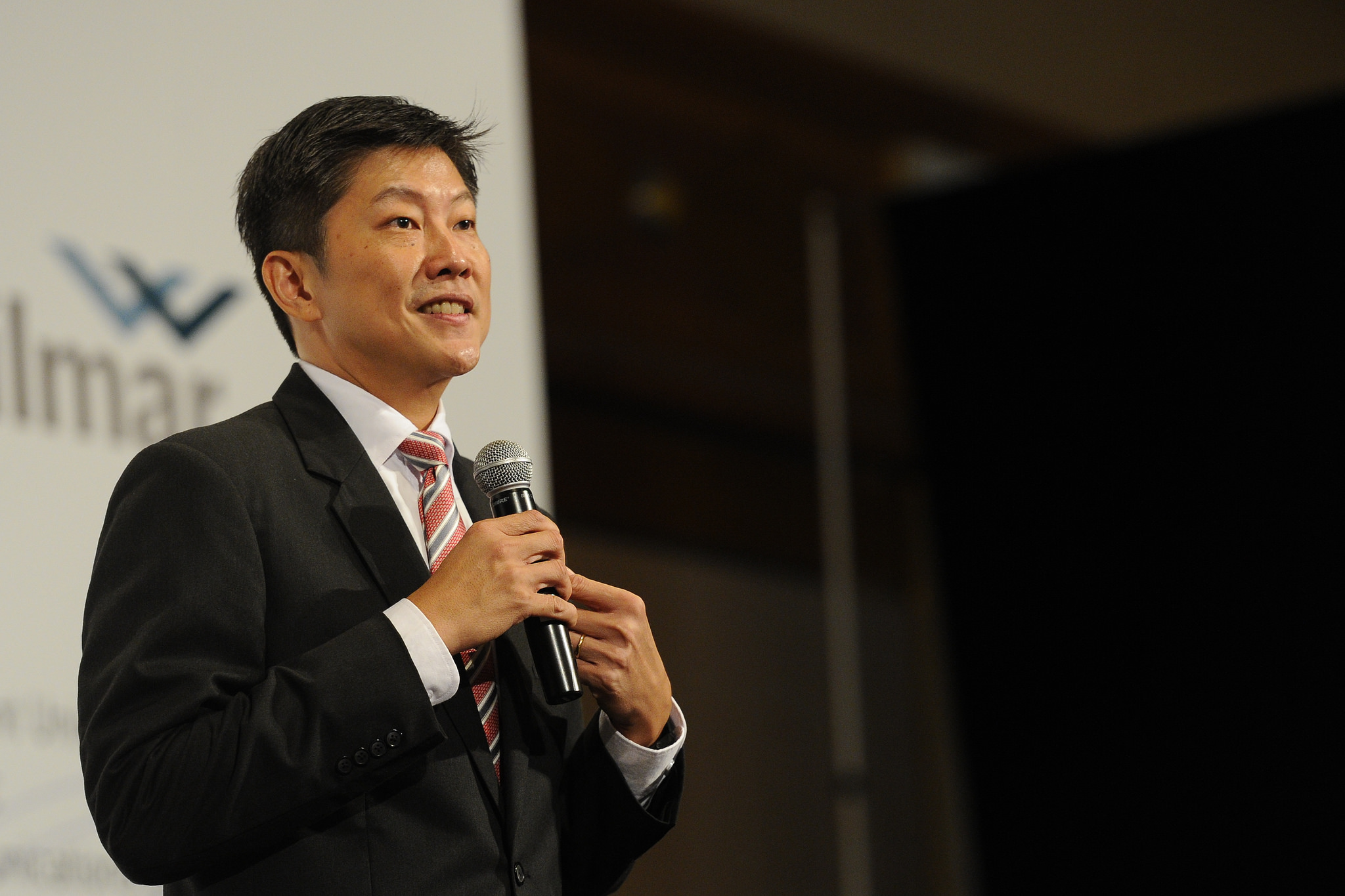 Photo courtesy of IPS
Photo courtesy of IPS
Speech-Making:
Ng's speech talked about how despite the diversity among Singaporeans, how Singaporeans can be more resilient as "One United People". He termed it "Cohesive Diversity"
As a new Minister, it is understandable he would play safe and not deviate from the prepared script or ad lib parts of his speech.
He possesses a commanding voice as expected from an ex-Military man, so he could at least hold your attention. His pacing was also just right and not snail-paced like a certain man with a white slickback. But he needs more practise if he wants to inspire people and stir visceral reactions with his speeches.
Sparring with intellectuals:
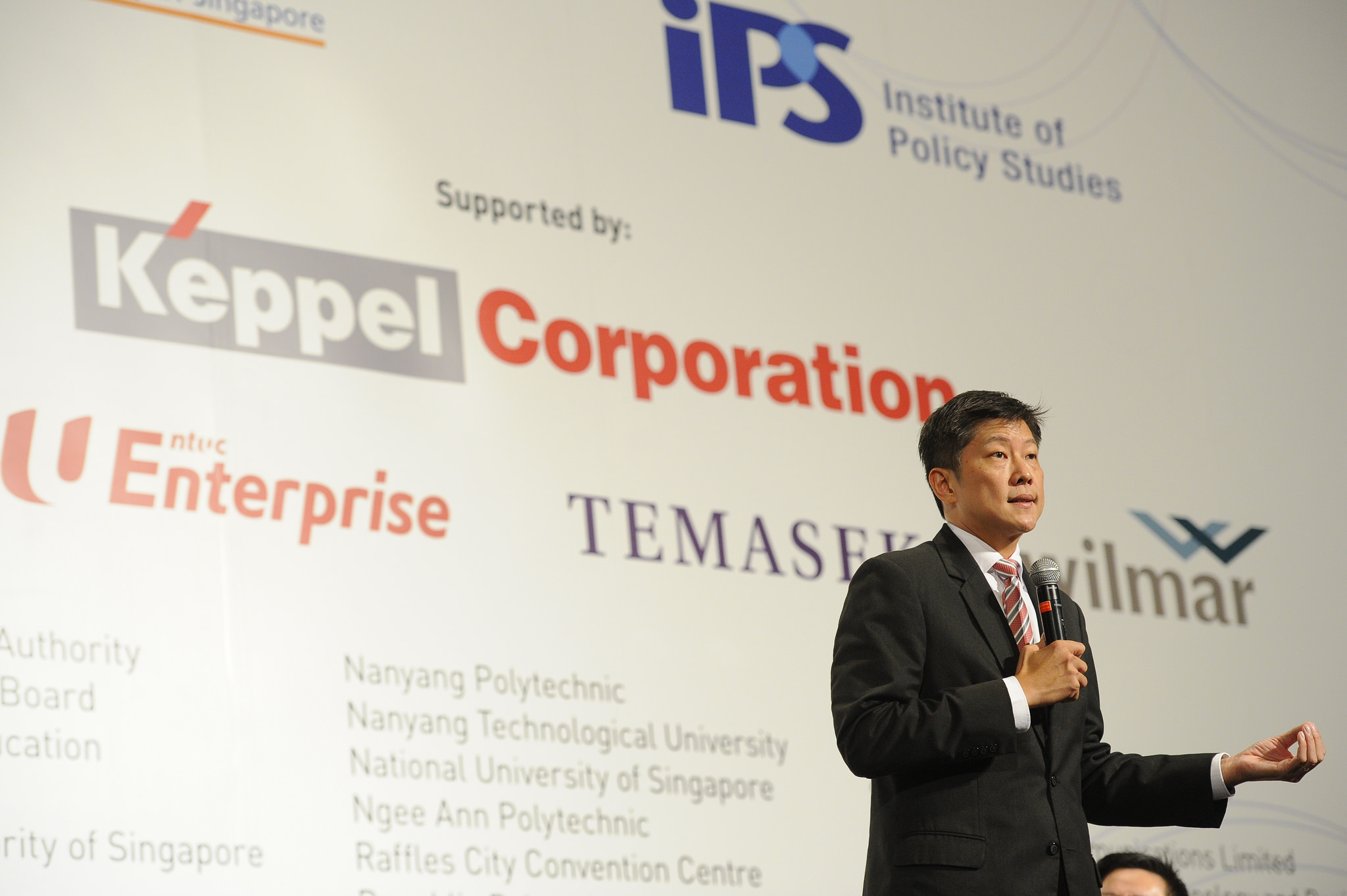 Photo courtesy of IPS
Photo courtesy of IPS
We give the Acting Education Minister a B3 for his effort. While he wasn't flustered by the intellectual muscle flexed by the panelists, which included Professor David Chan, Director of Behavioural Sciences at SMU, he didn't exactly impress with his responses to queries raised.
Questions raised include whether the CMIO (Chinese, Malay, Indian, Others) model is still relevant and how will the rights of minorities, such as single mothers and LGBT groups, be protected especially when protecting these rights require the approval of the majority.
Ng answered both of them largely in the same way - that we will have to see how society pans out before the Government or anyone can make more changes, which is not saying very much.
Q&A with the public:
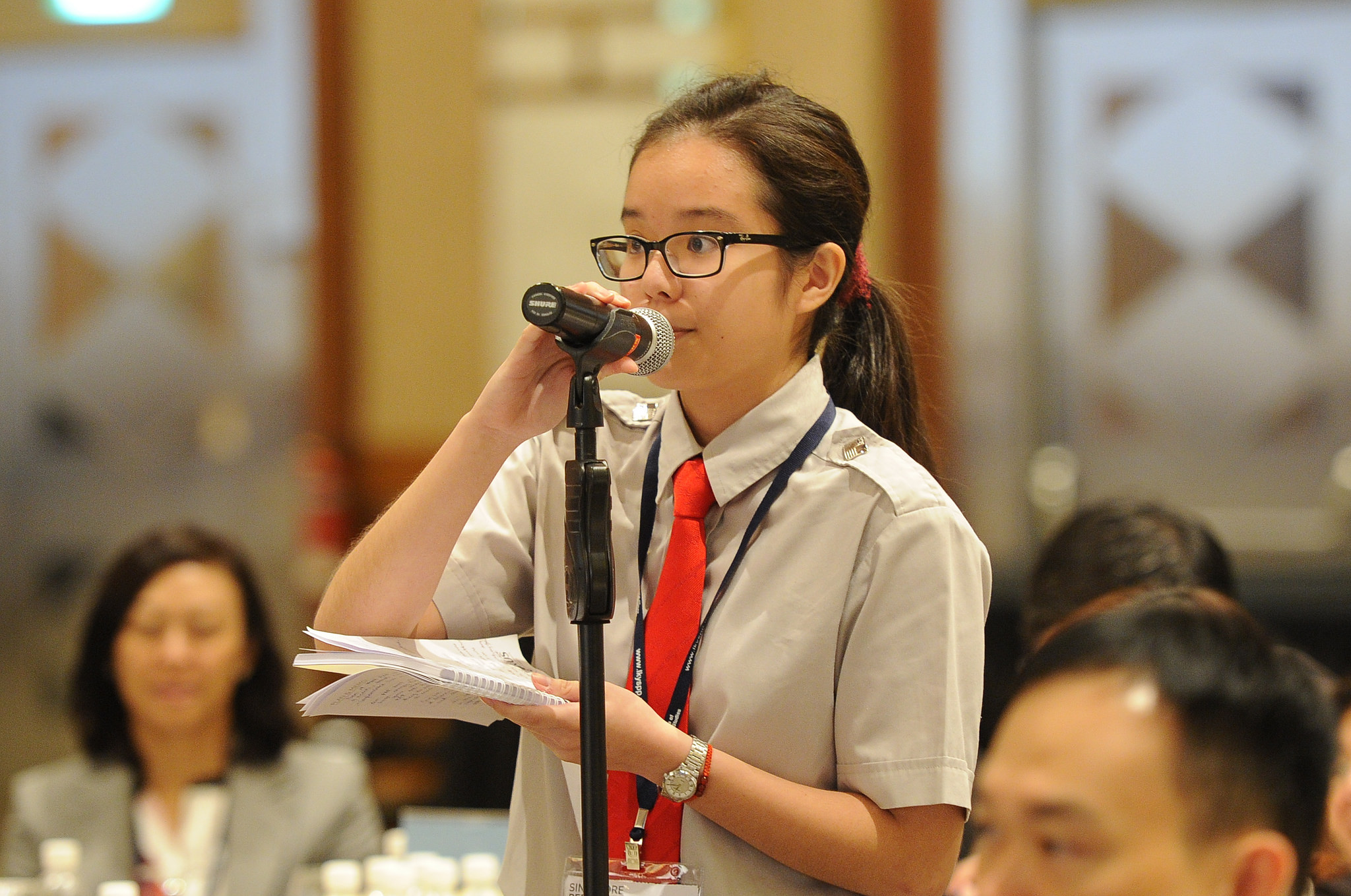 Photo courtesy of IPS
Photo courtesy of IPS
It was oddly satisfying that two students managed to upstage the Minister when they asked their questions eloquently and with much more passion and conviction than what the Minister displayed.
The first student, a girl from National Junior College, asked about how minorities (she specifically mentions single mothers and LGBTs) can be part of the "cohesive diversity" if they were still being marginalised. She asked Ng whether the Government had a definitive stance on LGBT rights. Ng replied by saying that forcing one view point is not the way, but to consider other view points, and that the solution might be for society to evolve over time.
Most quotable quote:
Interestingly, during the exchange with the National Junior College student on LGBT rights and wanting to explain the challenges of handling LGBT issues, he mistook that she was from NUS High, here's what was said:
Ng: It will not be satisfactory, especially for a bright young student, young girl like you, from a school ... did you say NUS High?
Student: National Junior College
Ng: Ok, still very technical science-based education. You want a cause-effect outcome almost immediately.
Not sure how all the teachers and students in the Art Elective Programme, Music Programme and Humanities Scholarship Programme in NJC are feeling right now.
3. Ong Ye Kung: 9/10
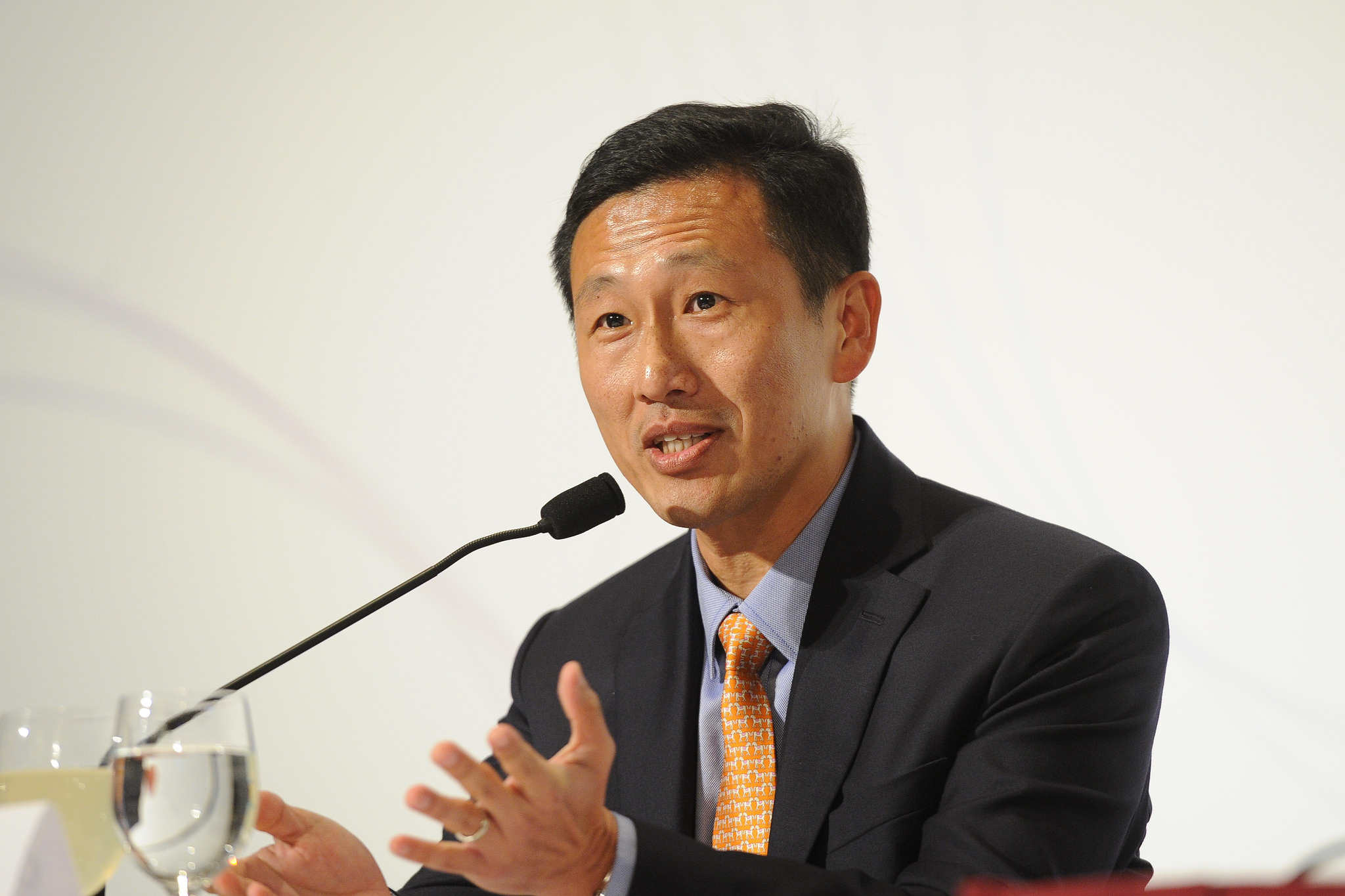 Photo courtesy of IPS
Photo courtesy of IPS
Speech-making:
Ong's speech was peppered with humour, sweetened with charisma, and also wasn't lacking in substantiality of content — given the heavy topic of "Inclusive Growth", he talked about the philosophical, the mechanical (evaluating means of measure of growth like GDP and the Gini coefficient and boldly criticising their weaknesses) and the concrete things that need to be done to achieve it.
Sparring with intellectuals:
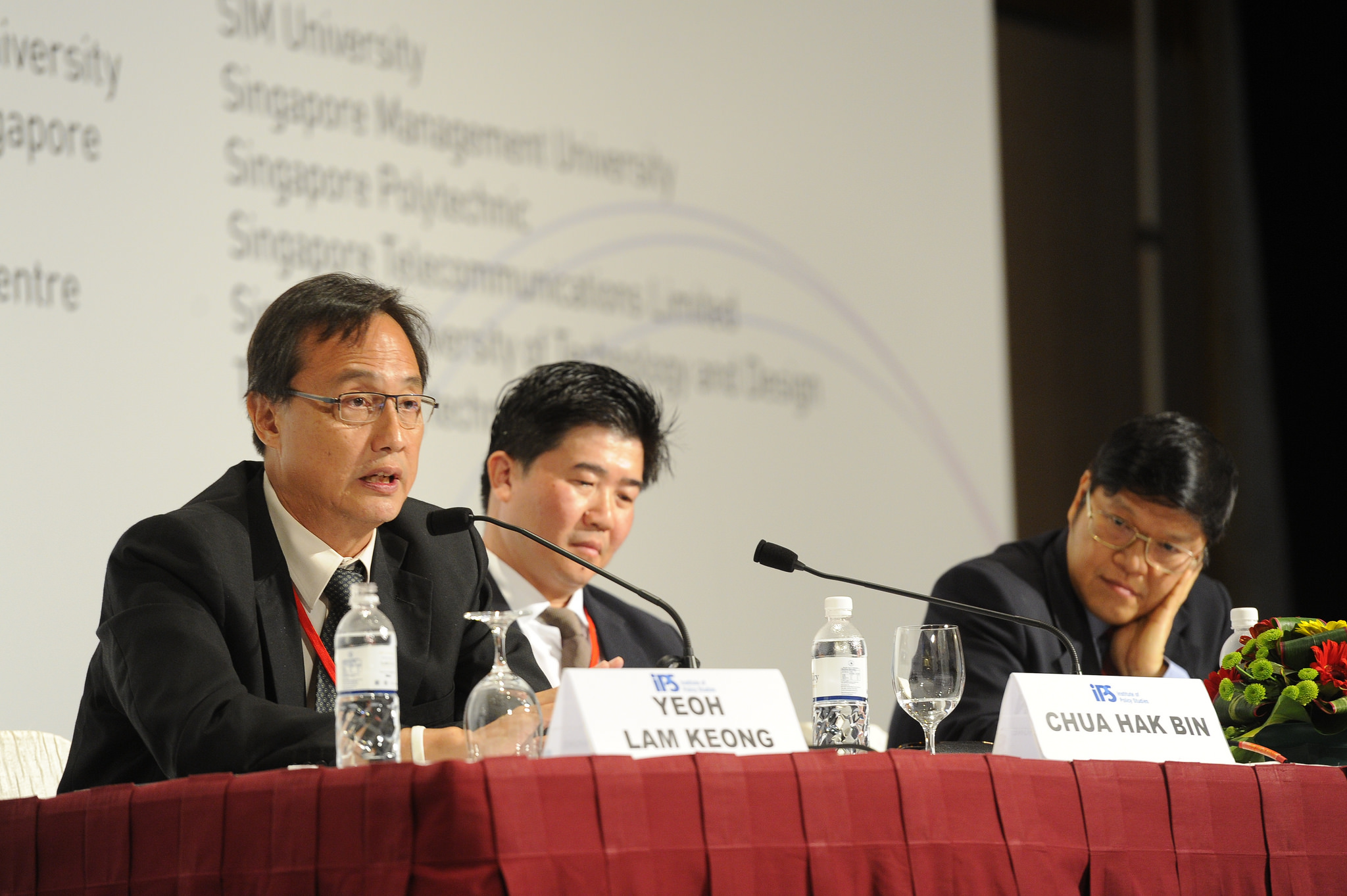 Photo courtesy of IPS
Photo courtesy of IPS
Ong deftly tackled a pretty challenging panel of renowned and established economists: former GIC chief economist Yeoh Lam Keong, who rapid-fired a series of really tough questions and points at him; Chua Hak Bin, who questioned the effectiveness of the government's multi billion-dollar Productivity and Innovation Credit scheme and the uncertainty of SkillsFuture; and Prof Tan Kong Yam, who voiced the opinion of businesses and the negative economic outlook in the coming years.
To them, Ong was frank in acknowledging the various pressing issues, while even noting the concerns expressed by the economists that the newly-formed Committee on the Future Economy would end up "tinkering" instead of doing something bold. He did counter, quite sensibly, though, that defining absolute poverty will be a challenge — for who's to say a person earning a higher salary but with more mouths to feed and parents to look after is less in need than a person who is earning a fraction of that but only has to look after himself and his wife, for instance?
Q&A with the public:
With the panellists tackling a few questions from the floor, Ong did not have a lot of time with the audience at the Q&A.
But here is an example of how Ong typically addressed a question from the audience.
On the question about the challenges faced by the silver haired generation in the workforce, Ong first acknowledged the participant, her background and her tough questions. He would go on to share his own experiences at the Employment and Employability Institute (e2i) and showed that he appreciated the specific challenges they faced, and how everyone in the society can do their part to help. He will then conclude with a quotable quote that sticks.
"Young people is (sic) like cash. There is a lot of currency with what they just embarked. Older people are like 'stored value' cards. The value is there but you must have the right interface to tap in. So that requires a new form of HR practice".
Most quotable quote:
(On why the GDP per capita as a measure is flawed) "I cook my dinner, you cook your dinner, we eat each other's dinner but the dinner we cook, there's no GDP. You cook your dinner and I cook my dinner and eat. But if we exchange dinner, then suddenly there's GDP, you know. Because it becomes tradeable and chances are the welfare actually drops because I may not like your cooking and you may not like mine."
4. Heng Swee Keat: 7.5/10
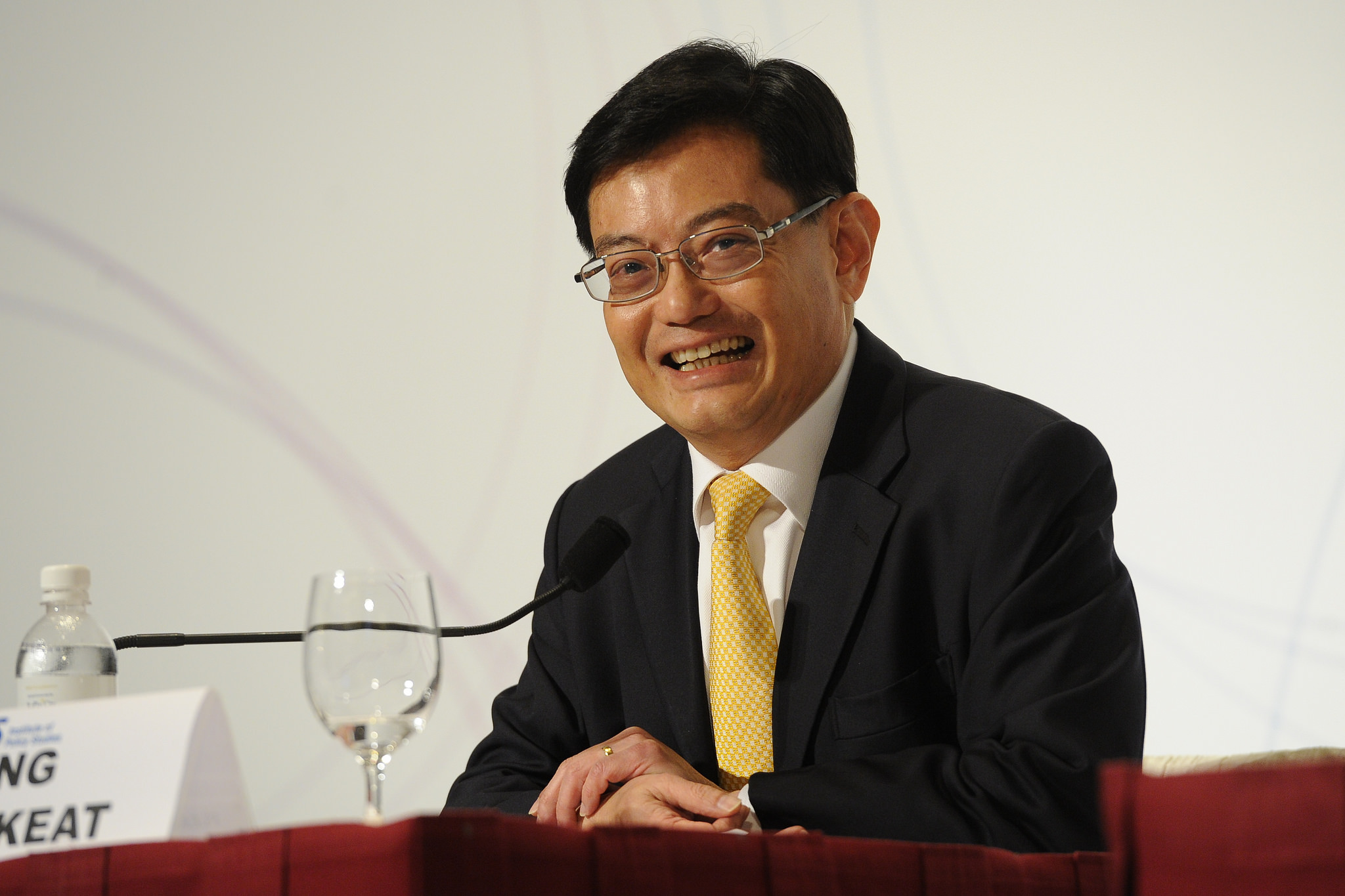 Photo courtesy of IPS
Photo courtesy of IPS
Speech-making:
Heng, we shall admit, had a challenging topic — how does one talk about the future in a credible fashion, anyway?
We were not entirely impressed by his attempt to butter up his panel — who to be fair, are all very esteemed folks in their own right: Banyan Tree founder and Chairman Ho Kwon Ping, as well as Ambassadors-at-large Bilahari Kausikan and Chan Heng Chee.
How'd he do this? By taking a letter from their names to extrapolate his vision — "H" from Chan, for hopes and aspirations of Singaporeans not changing; "B" from Bilahari, to note that the concept of borders will be changed entirely by technology; "K" from Ho, for kinship that he hopes will endure as Singapore's society becomes more diverse; even using "D" from session chair Debra Soon to stress the importance of dialogue to find agreement among differences and achieve a common goal.
All that said, he covered his fluffy-sounding topic in a fairly well-rounded manner, and we give him points for doing his best — albeit with attempts at jokes that fell largely flat on an audience tired from a long day.
Sparring with intellectuals:
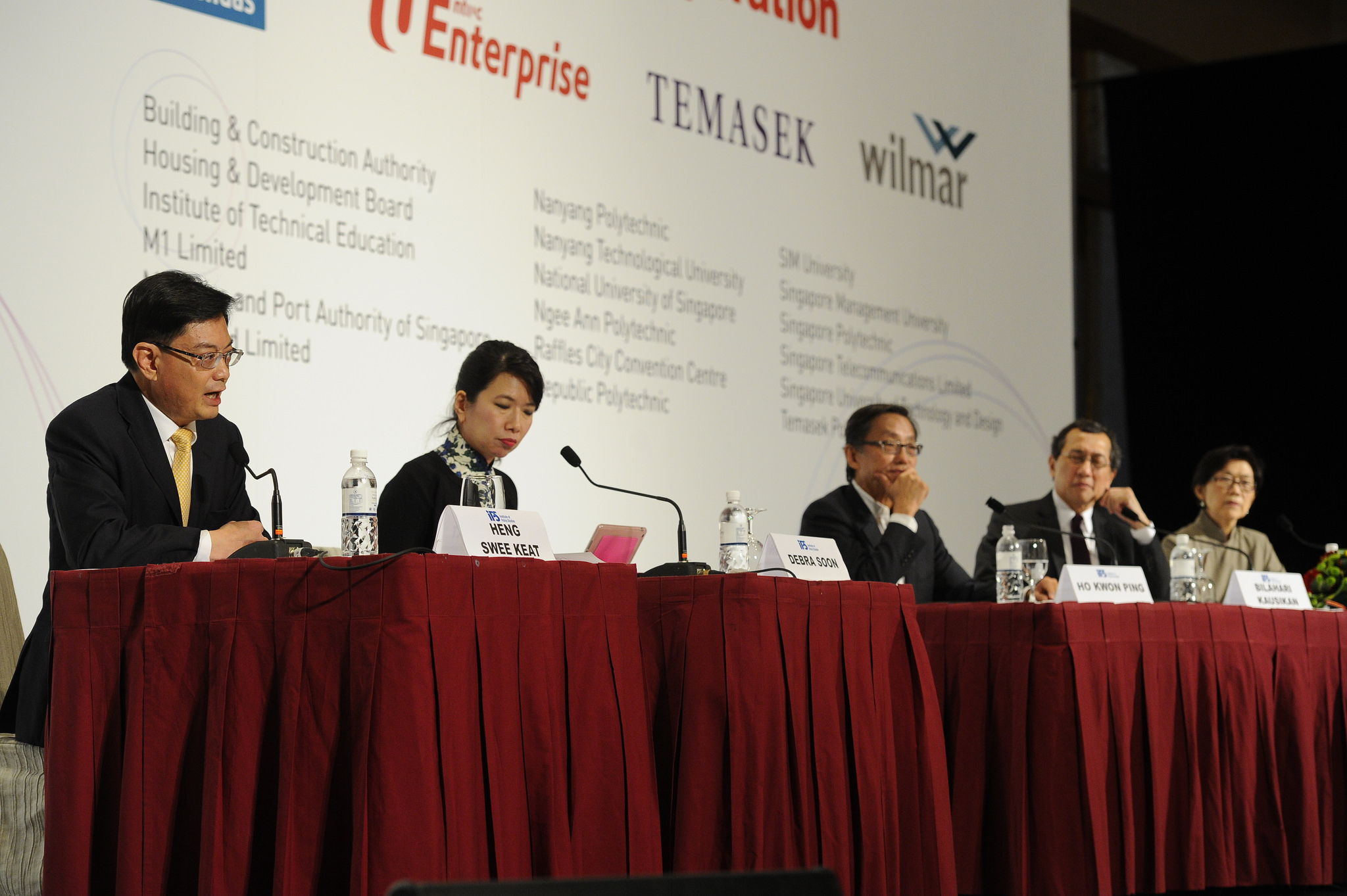 Photo courtesy of IPS
Photo courtesy of IPS
In our minds, Ho, Bilahari and Chan went easy on Heng.
Ho and Chan both spoke of the elephant in the room — that this entire day's event was a mini-competition between four of Singapore's ministers who are tipped to succeed Prime Minister Lee Hsien Loong.
In the fourth minute of the discussion among the panel, Ho ventured this:
"Incidentally, just to make sure that there is no added pressure to you, sir, many people have said that this is a beauty parade of future prime ministers and Minister Heng happens to be the front-runner — no pressure, sir. No pressure. (everyone laughs)
If this were in America, we would be asking each one of the speakers today, what is it that you are going to do that differentiates you from your competitor, and your predecessor. But we are in Singapore — we're very united, we all speak with one tongue."
The panelists, seeming to be in a merciful mood, spent the rest of the session low-balling Heng questions on topics like information access, what good politics is and what benchmarks Singapore should chart of its own, Heng's vision for Singapore's future and its leadership style.
To his credit, Heng tackled them well, but said nothing revolutionary, so we're pretty underwhelmed by it all. The only redeeming point came after audience questions fizzled out later on, and he and Chan had an interesting exchange about the teaching of history in schools here — how more needs to be taught about our first-generation leaders like the late Goh Keng Swee and S. Rajaratnam.
Q&A with the public:
We were rather disappointed with this segment of the session, especially since there were only three questions asked by members of the audience — one on the Malay-Muslim community, one on state support given to them and the last on the government's position on LGBT rights and Section 377(a) of the Penal Code.
Heng spent most of it skirting the questions instead of answering them directly, making very "safe" statements about things he did previously as Education Minister and how Singaporeans should relate to one another. Even when asked directly about LGBTs and Section 377(a), with Ho Kwon Ping initiating and an audience member following up on this, too, Heng ended up disassociating his personal view from that of the government, and said it's tough to get a society moving on a decision made when not everyone buys into it.
Most quotable quote:
(on U.S. political culture) "In the case of the U.S. where the parties are becoming more and more polarised.... there's just a lot of grandstanding, and people will tell you in private that 'actually, I don't believe in what I just said but I have to say it because the TV is there and all that. And that I think is very dysfunctional, and I hope that we maintain a certain seriousness of purpose in our political life."
It looks like The Straits Times came away with a good impression, though, ranking him highly compared to the others: they granted him an impressive top-half page (complete with a nice big picture) all to himself in their broadsheet layout, while the other three ministers were relegated to sharing the left-hand page:
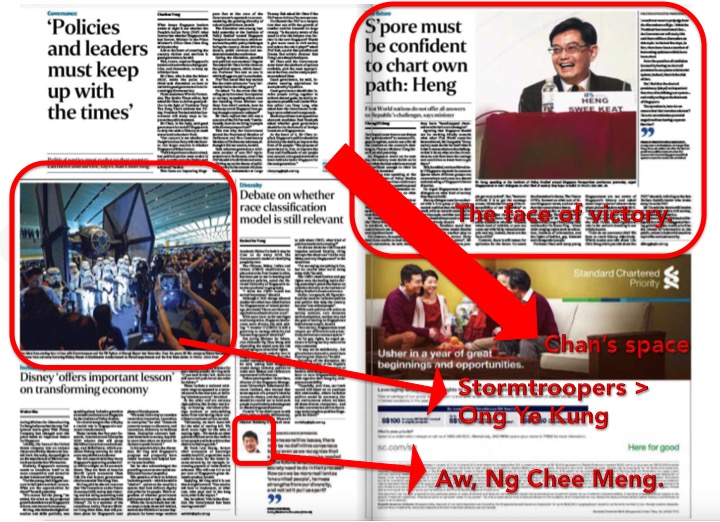 Screenshot from The Straits Times Online
Screenshot from The Straits Times Online
What a way to indicate their choice of who's who, eh.
So, how'd they do?
According to the IPS, almost 900 leaders in their fields and interested members of the public attended Monday's conference.
We conducted a confidential informal poll with twenty-three attendees – academics, corporate sector professionals, former journalists, journalists and researchers – and sought their feedback on how the four 4G leaders fared in terms of their performances and interaction with the panellists and the audience.
After all, it was in Ho’s words “a beauty parade of future prime ministers”. 83 per cent of those polled (19/23) felt that Ong was the stand-out Minister, with Ng finishing last among 74 per cent of the respondents (17/23).
If Ng chose to stand out by standing up to speak (with the rest of the panelists seated), the effort bombed terribly. Maybe Ng could think better on his feet when he is literally on his feet. This Ng standing at the dialogue session with his panelists seated may well be his "kee qiu" moment.
Chan and Heng were seen to have engaged the audience well and were clearly more comfortable with the tough crowd than Ng. Heng and Chan’s past experiences at the IPS Perspectives could have helped since both Heng and Chan were the guests of honour and speakers for Singapore Perspectives 2014 and 2015 respectively.
If there was a meme that defined the "beauty contest" yesterday, this would be it:
 Source: Sgag
Source: Sgag
For nearly 900 minus 23 participants we did not ask, you can cast your votes here:
Photos courtesy of IPS.
If you like what you read, follow us on Facebook and Twitter to get the latest updates.
If you like what you read, follow us on Facebook, Instagram, Twitter and Telegram to get the latest updates.
